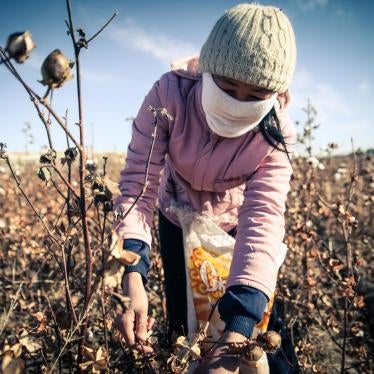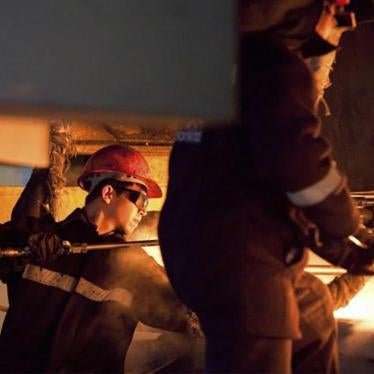(New York) - The European Bank for Reconstruction and Development has made clear that Turkmenistan's government needs to improve its poor human rights record before it can expect normalized relations, Human Rights Watch said today.
The bank's new country strategy for Turkmenistan, published yesterday, sets specific human rights benchmarks for the Turkmen government to fulfill, and makes the bank's level of engagement dependant on Turkmenistan's progress in meeting them.
"The bank has made clear it expects reforms in exchange for enhanced relations," said Veronika Szente Goldston, advocacy director for Europe and Central Asia at Human Rights Watch. "Now it's up to Turkmenistan's leadership to heed these calls and take the steps the bank has identified as necessary."
The bank's shareholder governments, many of them important bilateral partners of Turkmenistan - such as Germany, France, the United States, and Japan - should actively back the bank's reform demands and ensure that their policies are fully consistent with the bank's approach, Human Rights Watch said.
In its strategy, the bank acknowledges "political and economic changes ... aimed at reversing social and economic policies of the previous regime," but concludes that "much remains to be done in the area of democratic competition and accountability, strengthening the rule of law and guaranteeing protection of human rights and media freedom." The strategy stresses that "the overall progress on implementation of the adopted laws, the rule of law and respect for human rights remains a serious concern."
The bank further said it will engage in a "proactive policy dialogue" with Turkmen authorities on the need for "accelerat[ed] reforms" and "openness." The bank also set specific "reform benchmarks" against which it will "actively and continually monitor developments" and report to the bank's board of directors on an annual basis. These benchmarks include:
- Progress toward genuine political pluralism and meaningful political accountability, including the strengthening of checks and balances in the political system, removal of impediments to registration and free functioning of nongovernmental organizations, and even-handed application of the rule of law;
- Substantial progress in increasing media freedom and freedom of expression; and
- Further significant progress in improving the country's human rights record, with the following singled out as "priority areas requiring urgent attention":
- The release of political prisoners;
- Free access for the International Committee of the Red Cross to places of detention;
- Removal of the remaining restrictions on foreign travel of its citizens, and;
- Freedom of the media and free functioning of civil society groups.
In what it terms "a calibrated strategic approach," the bank reserved the right "to increase its engagement with Turkmenistan" - a move that marks a notable shift away from its prior, more restrictive approach of a complete ban on public sector investment. But it expressly linked any increase in operations to progress by the Turkmen side in meeting the reform expectations the bank has set forth. The strategy describes the bank's approach as "carefully calibrated to increase its operational scope in a measured and incremental way, as the Turkmen authorities make progress in political and economic reform."
The bank, set up in 1991 to promote market economy in countries "committed to and applying the principles of multiparty democracy, pluralism and market economics," is unique in having an explicit political mandate. This mandate makes it all the more important for the bank to ensure any enhancement in relations with Turkmenistan is made strictly conditional on human rights progress.
"The bank has put its political mandate to good use by setting benchmarks for human rights compliance and linking its level of engagement to their fulfillment," Szente Goldston said. "A key test of this commitment will be the bank's - and indeed its shareholders' - resolve in enforcing this linkage, which requires staying true to the reform demands, and engaging in a genuine effort to ensure they are carried through."
The strategy states the bank "will continue to be guided by its mandate." In a separate document, the bank goes even further, explaining that it "is not conducting ‘business as usual' in Turkmenistan," and that its "modified strategic approach does not resume ‘normal' operations, insofar as the operating environment remains difficult and there are gaps with respect to compliance [with the bank's political mandate]."
Turkmenistan is one of the most repressive countries in the world. It is also a country rich in natural gas, making it an important strategic partner to many governments.
Unknown numbers of political prisoners languish in Turkmenistan's prisons, and the rights to freedom of expression, association, assembly, movement, and religion are subject to draconian restrictions. Independent civil society and media cannot operate openly, if at all. The government threatens, harasses, and arrests those who question its policies, however modestly.
In a letter to the EBRD board of directors in advance of its discussion of the Turkmenistan strategy, Human Rights Watch urged the bank to stay true to its political mandate and refrain from public sector investment until such time as the Turkmen government makes credible progress toward meeting the benchmarks the bank has set for it. The letter objects to the bank's reference to "recent progress in the political...sphere" as "provid[ing] an opportunity for deeper engagement," and critiques its description of a number of key human rights developments as incomplete, raising questions about the bank's commitment to an objective and accurate assessment of the situation on the ground.






